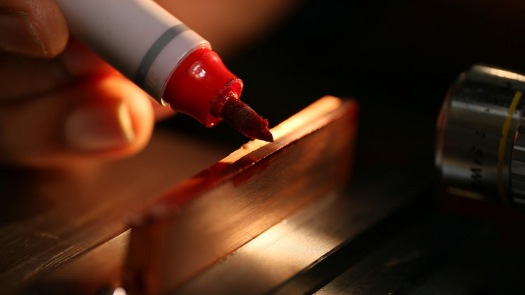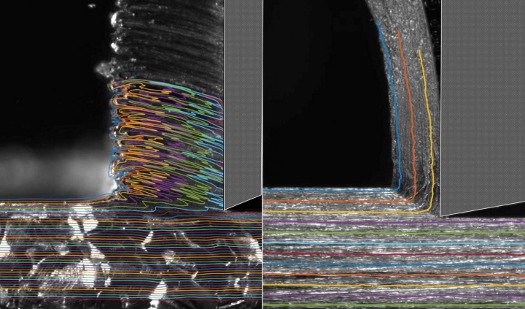 |
| June 01, 2021 | Volume 17 Issue 21 |
Designfax weekly eMagazine
Archives
Partners
Manufacturing Center
Product Spotlight
Modern Applications News
Metalworking Ideas For
Today's Job Shops
Tooling and Production
Strategies for large
metalworking plants
Gummy metals cut better when marked with Sharpie or glue -- researchers figuring out why

The application of a permanent marker, glue, or adhesive makes gummy metals such as aluminum, stainless steels, copper and tantalum much easier to cut for industrial applications. [Credit: Purdue University/Erin Easterling]
It was back in 2018 that researchers from Purdue University first announced results of their deep dive into finding ways to make gummy metals such as aluminum, stainless steels, nickel, copper, and tantalum easier to cut. They found that first marking the metals with certain common substances -- like a Sharpie marker or glue -- can make big improvements. Now they are figuring out why.
Their ongoing research and its results may help in manufacturing products and reducing component failures.
The researchers previously showed that marking the metal surface to be machined with ink or an adhesive dramatically reduced the force of cutting, leaving a clean cut in seconds.
One well-known way to make the gummy metal brittle is by coating it with a suitable liquid metal, such as gallium in the case of aluminum. Liquid metals like these, however, tend to work too well; diffusing through the surface and causing the whole metal to crumble into a powder.
"This makes the metal being machined unusable," said Srinivasan Chandrasekar, Purdue professor of industrial engineering.
Attempts using other types of applied media met with limited success and tended to be either toxic or result in tears and cracks on the machined surface. The researchers then began to explore other benign chemical media that would cut cleaner.
VIDEO: Everyday permanent markers, glue sticks, packing tape, and common alcohols may offer a surprisingly low-tech solution to a long-standing nuisance in the manufacturing industry: Making soft and ductile, or so-called "gummy" metals, easier to cut. [Credit: Purdue University]
Eventually, they found that marking with ink or attaching any adhesive on the metal's surface dramatically reduced the force of cutting without the whole metal falling apart, leaving a clean cut in seconds. The quality of the machined surface also greatly improved.
Then the team started asking why, and they found an answer.
"Gummy metals characteristically deform in a very wiggly manner," said Chandrasekar back in 2018. "This wiggly flow involves significant energy consumption, which means that these metals require more force to machine than even some hard metals. We needed to find a way to suppress this wiggly flow."
Getting rid of the wiggles means that the metal tends to act more like a brittle ceramic or glass in the spot where it needs to be cut. Using a thin coating of ink or an adhesive did the trick. [Editor's Note: Please watch the video. There is a section in it -- from 1 min. 30 sec. on -- that demonstrates this.]

Purdue researchers have discovered a simple solution for cutting soft gummy metals (left) -- which tend to "bunch up" or "wriggle" when cut -- just as cleanly and easily as hard metals (right). [Credit: Purdue University image/Anirudh Udupa]
In a 2019 update, the researchers used common alcohols on an aluminum surface and were able to cut the metal more easily, with at least 50% less force, and produce a smoother end surface with fewer cracks and tears compared with aluminum without the alcohol treatment.
Overall, they determined, each metal system requires a specific designer agent (the name for a variety of chemicals used in metals processing), since alcohols do not interact with other metals in the same way as they do with aluminum.
Now, the Purdue team is working on how these films and designer agents produce the effect.
"We have found that you only need the organic film from the markers or glue to be one molecule thick for it to work," said Chandrasekar in his latest update. "This ultra-thin film helps achieve smoother, cleaner, and faster cuts than current machining processes. It also reduces the cutting forces and energy, and improves the outcomes for manufacturing across industries such as biomedical, energy, defense, and aerospace."
The latest research was published in Science Advances in Dec. 2020. The study involves a collaboration between researchers at Purdue, Osaka University (Japan), and the Indian Institute of Science (India). The research is supported by the National Science Foundation and U.S. Department of Energy.
The researchers found, using organic monolayer films created by molecular self-assembly, that the molecule chain length and its adsorption to the metal surface are key to realizing these improvements. By using the "right" organic molecules, the metal is locally embrittled -- resulting in improved machining.
"We are also learning through our discovery more about how environmental factors influence failure of metals," said Anirudh Udupa, a lead author on the study and a researcher in Purdue's School of Industrial Engineering. "As we decipher how the organic molecular films improve the machinability of these metals, the better also is our understanding of common environment-assisted failures in metals, such as stress-corrosion cracking, hydrogen embrittlement, and liquid metal embrittlement."
VIDEO: Improving metal cutting with organic monolayers. [Credit: Purdue Univeristy]
The researchers are looking for partners to continue developing their technology. For more information on licensing and other opportunities, contact Purdue's Office of Technology Commercialization (OTC) at otcip@prf.org and mention track code 2019-CHAN-68634.
Source: Purdue University
Published June 2021
Rate this article
View our terms of use and privacy policy
